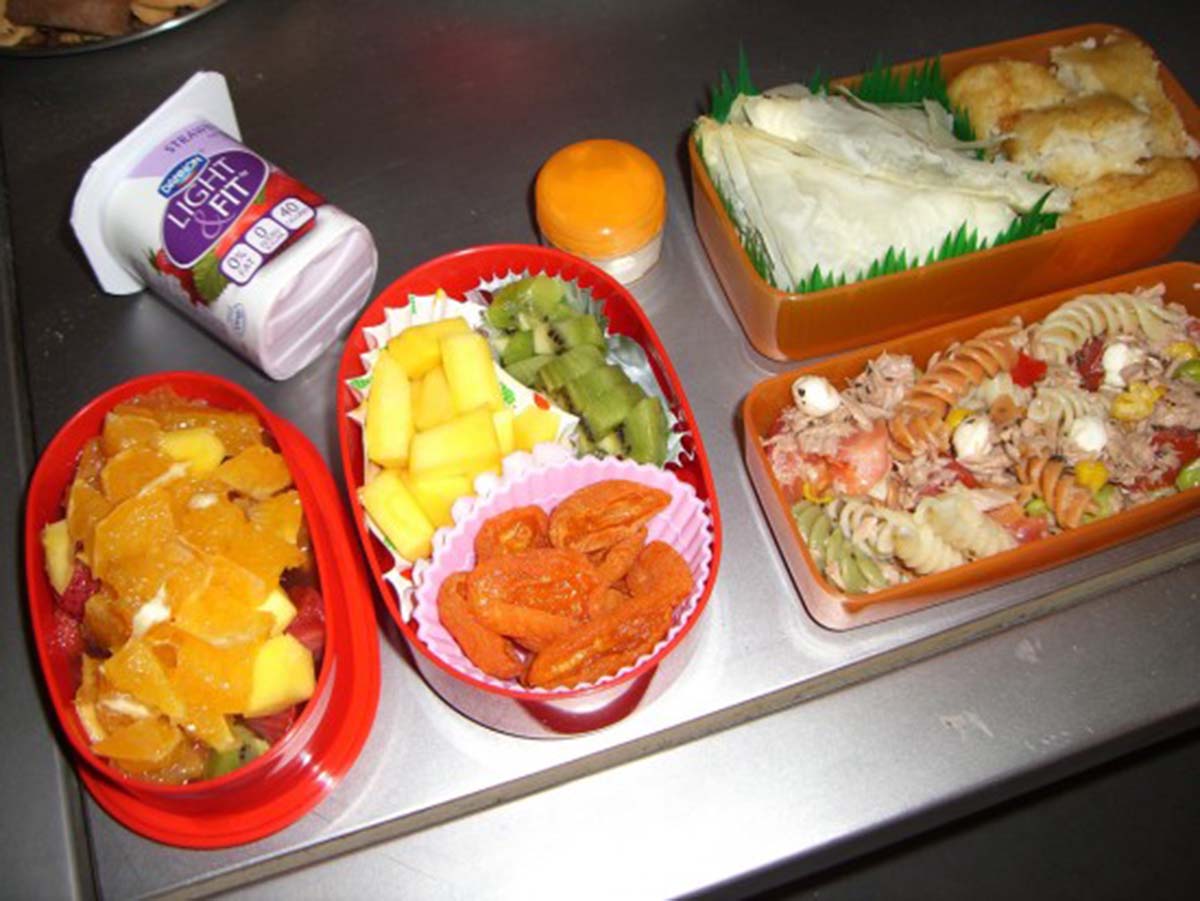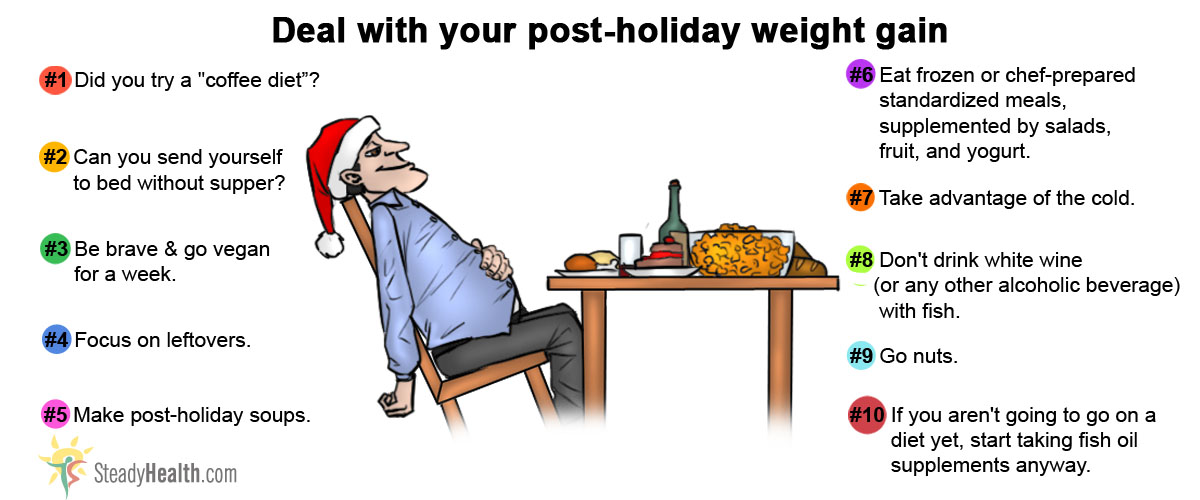Nutritionist and weight maintenance researcher Brad Pilon is fond of saying that at least in North America there are three main causes of weight gain: Halloween, Thanksgiving, and Christmas. Now that the end-of-year overeating season has passed, it's time to look at new strategies for taking off the pounds.
1. Try a "coffee diet."
It doesn't work for everyone, but the chlorogenic acid in coffee is an effective blocker of carbohydrate absorption. Of course, if you don't eat carbohydrates, there won't be any carbohydrates for chlorogenic acid to block, but if you are just making the transition back to normal eating patterns after holiday overindulgence, it can help slow down carb absorption from food so that your body has at least a chance to burn fat instead of creating it from excess carbohydrates.
Either make sure to have black coffee with a couple of meals each day, or take green coffee products.
2. Send yourself to bed without supper.
After overeating for weeks on end, you really won't starve if you skip a meal at the beginning or the end of the day. Going 12 to 18 hours without eating (no snacks, either) gives your cells a chance to "clean up" broken proteins and damaged DNA, and also allows your body to burn fat instead of storing it. It's actually safe for most people to go up to 48 hours without eating, but skipping just one meal, maybe twice a week, will help you lose weight and feel better.
Don't try this approach if you are on a fixed dosage of insulin or if you have any metabolic condition for which your doctor has told you that it is necessary to eat every meal, every day.
3. Go vegan for a week.
Vegan, raw foods diets, even if you just follow them for a few days, can be very helpful for diabetics who need to kick-start weight loss. Many diabetics manage to cut out the excess carbohydrates but replace them with excess protein--and their bodies transform unneeded amino acids from protein into sugar with toxic urea as a byproduct.
4. Focus on leftovers.
Variety is not just the spice of life. It also powers our appetites. When we eat the same food day after day, we lose our appetites. So if you cooked a huge Christmas ham or turkey, go ahead and eat it. Eat it every day until it's all gone. Don't be creative--the whole idea is for your food to be boring, for a change. When you limit your food choices, you eat less food.
Read More: How To Track Calories And Diet During The Holidays
5. Make post-holiday soups.
University of Pennsylvania Medical School and Pennsylvania State University nutrition researcher Barbara Rolls conducted over 150 studies of "volumetrics," an approach to dieting that involves filling up on "watery" foods. Drinking water does not really fill you up, because it does not have to be digested.
Rolls found that simply having a cup of soup at the beginning of a meal resulted in feeling full on 150 fewer calories. If you eat two cups of soup a day, you might lose an extra 1/2 to 3/4 pound (200-300 grams) a week, but without trying, and without feeling deprived.
Five More Ways Of Losing Weight After The Holidays
6. Eat frozen or chef-prepared standardized meals, supplemented by salads, fruit, and yogurt.
The simple reality of reduced calorie diets is that we almost always forget how many calories we have eaten. That is the reason it can be a good idea to let someone do the calorie counting for you. Choose frozen breakfast, lunch, and dinner meals you like, making sure the total calories from those meals is well with you diet goals.

This way you may actually lose a pound or two during the week between Christmas and New Years (or, depending on your tradition, New Years and Christmas) and you will be ready for even more weight loss in January.
7. Take advantage of the cold.
One of the ways the body keeps itself warm is by activating "brown" fat cells, which generate heat from fat. Even though the body has under a 100 grams (3 ounces) of this kind of fat, under cold conditions it can burn 300 to 500 calories a day. Get a couple hours exposure to temperatures of 5 degrees C/40 degrees F or lower, without a coat or protective clothing. and you will lose weight effortlessly. Or do a "polar bear" swim (with someone around to help if you get too cold) not just on New Year's Day, but every day. Swimming in an outdoor pool can also accelerate fat loss.
8. Don't drink white wine (or any other alcoholic beverage) with fish.
Fish is great diet food. The omega-3 essential fatty acids in cold-water fish such as salmon and herring help reduce cravings for fatty foods, and they enable the body to produce hormones that reduce inflammation and water retention in belly fat.
The reason for this is the way the liver detoxifies alcohol, by transforming it into a chemical called acetaldehyde. The acetaldehyde in turn neutralizes omega-3 essential fatty acids, and the liver winds up transforming them into cholesterol or stored fat rather than inflammation-fighting hormones.
9. Go nuts.
Almonds, walnuts, and pecans have an unexpected effect on weight. Within limits, eating more nuts results in losing more weight, even when calories added to the diet. A series of studies have found that the addition of a "handful," up to 100 grams/3-1/2 ounces of nuts every day to regular diets results in loss of an additional pound (about 500 grams) every month, without any effort to diet. Even better, eating nuts typically lowers cholesterol and triglyceride, too. Peanuts, unfortunately, do not have the weight loss effect.
Read More: Staying on a Weight Loss Diet during this Christmas: Healthy Holiday Treats
10. If you aren't going to go on a diet yet, start taking fish oil supplements anyway.
Scientists at the Nutraceuticals Research Group at the University of Newcastle in Australia conducted an experiment in which future dieters were asked to take either 6 capsules of fish oil or 6 capsules of a placebo every day for 4 weeks before going on a diet.
Then the scientists measured weight loss after 4 weeks on the weight loss plan. Dieters who took fish oil before going on a diet lost, on average, about 50% more than those who did not, possibly because of reduced inflammation in fat pads in the belly, on the hips, and on the thighs.
- Callahan E. Changes in weight loss and lipid profiles after a dietary purification program: a prospective case series. J Chiropr Med. 2013 Mar
- 12(1):30-8. doi: 10.1016/j.jcm.2012.11.004. PMID: 23997722.
- Foster GD, Shantz KL, Vander Veur SS, Oliver TL, Lent MR, Virus A, Szapary PO, Rader DJ, Zemel BS, Gilden-Tsai A. A randomized trial of the effects of an almond-enriched, hypocaloric diet in the treatment of obesity. Am J Clin Nutr. 2012 Aug. 96(2):249-54. doi: 10.3945/ajcn.112.037895. Epub 2012 Jun 27.
- Mindmap by steadyhealth.com
- Photo courtesy of Lucia Sanchez by Flickr : www.flickr.com/photos/gusilu/461267748/



Your thoughts on this